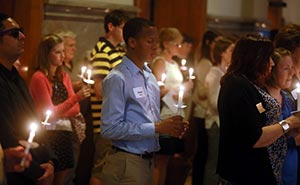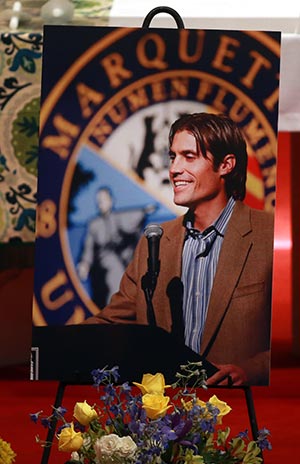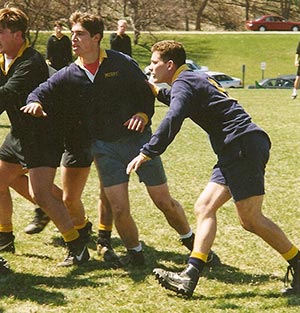His first memory of James Foley is of a young man playing rugby in his hiking boots. More than 900 people attend a prayer vigil Aug. 26 honoring the life of slain journalist and 1996 Marquette University graduate James Foley at Gesu Church on the Marquette campus, Milwaukee. (Catholic Herald photo by Allen Fredrickson)
More than 900 people attend a prayer vigil Aug. 26 honoring the life of slain journalist and 1996 Marquette University graduate James Foley at Gesu Church on the Marquette campus, Milwaukee. (Catholic Herald photo by Allen Fredrickson)
Milwaukee Police Lieutenant Boris Turcinovic, rugby coach at Marquette University from 1994 to 2003, laughed as he remembered the young Foley running across the field in hiking boots.
“Well, you know, it’s college and rugby boots back then were like $65-$70, which on a college budge is not cheap,” said Turcinovic, assistant rugby coach at Divine Savior Holy Angels High School. “So, he came out and he was obviously athletic, and I’m like, ‘Man, you need to get yourself some proper rugby boots or some soccer cleats – something.’”
RELATED ARTICLESPope Francis phones family of slain journalist James Foley Faith, prayer sources of strength for slain U.S. journalist James Foley, his family |
All laughter aside, Turcinovic described the Foley he met while coaching at Marquette, as a “laid-back” guy and “just a really, really good friend.”
“What I liked about Jim is that he wasn’t a consistent starter, but he still came to practice,” he said of Foley, who played second and third row in the four years he was part of the team that finished first in Wisconsin in 1996.
Foley was part of a team, a “very special group of guys” that made Turcinovic proud – he can still list scores from the fall of 1995 when other teams didn’t score on them – and he liked watching the moments when his players were being kids and having what he described as “team bonding moments.”
Like when they beat Stevens Point 29-0 during the second semester of their junior year, and Foley’s friend who had scored all of the tries that day jumped on his back and said the least he could do was carry him to the social.
He was the kind of guy who stood up for people and was “just a consummate friend,” Turcinovic said. An image of James Foley, taken during a December 2011 speaking engagement at Marquette University, is on display at Gesu Church, Milwaukee, during the Aug. 26 memorial service. (Catholic Herald photo by Allen Fredrickson)
An image of James Foley, taken during a December 2011 speaking engagement at Marquette University, is on display at Gesu Church, Milwaukee, during the Aug. 26 memorial service. (Catholic Herald photo by Allen Fredrickson)
Foley also stood up for people, even if it meant getting himself hurt in the end, like the time a guy was coming on too strong to one of Foley’s girl friends.
“He’s just the ultimate friend, more than anything else,” Turcinovic said.
That was the main message Tuesday, Aug. 26 when more than 900 people filled Gesu Church on Marquette University’s campus for a prayer vigil honoring the life of the slain journalist and 1996 Marquette University graduate.
Foley was kidnapped while reporting on the war in Syria in November 2012, and executed Aug. 19 by the Islamic State, which posted a video of his death, saying it was in retaliation for U.S. airstrikes in northern Iraq.
Foley became known by the general public as a freelance journalist when he was apprehended on a Libyan battlefield in 2011, and was later released to tell about it, but to the people who filled the pews and lined the back and sides of Gesu, he was so much more.
That was expressed in the welcome made by Michael Lovell, president of Marquette University, as he thanked everyone for joining in remembering “the courageous and compassionate life of James Foley,” whose life, he said, “embodied social justice.”
It was expressed by the chaplain of the Marquette University Alumni Association Jesuit Fr. Frederick Zagone, who read an email Foley wrote to him in June 2011, after he was released from captivity, thanking him and the Marquette community for their “efforts and prayers when he was first held captive in Libya.”
It was expressed in the remarks shared by Lori Bergen, dean of the J. William and Mary Diederich College of Communication at Marquette, who described Foley as a “brave, dedicated and extraordinary journalist.”
She recalled that during his two-day visit to Marquette in December 2011, to give the Nieman Lecture in Journalism for the College of Communication, Foley did more than speak to classes, meet with students and share his experiences.
“He also showed us his faith, his humor, his gentle, teacher side, and even, I might add, his sweetness. …” she said. “In his drive to tell these untold stories, to humanize and explain the complexity and impact of war on real people, for an audience far removed by both geography and even interest, Jim Foley told us everything about himself. Jim was a courageous journalist whose faith and service were grounded in the Marquette ethos.”
 James Foley, center, plays rugby with his Marquette University teammates in this photo taken in Fall 1996. (Submitted photo courtesy Boris Turcinovic)Tom Durkin, a Marquette graduate and friend of Foley’s, shared remarks in a letter he and other friends wrote to “Jimmy,” modeled after the letter that Foley had a freed journalist memorize and share with his family when he was held in captivity.
James Foley, center, plays rugby with his Marquette University teammates in this photo taken in Fall 1996. (Submitted photo courtesy Boris Turcinovic)Tom Durkin, a Marquette graduate and friend of Foley’s, shared remarks in a letter he and other friends wrote to “Jimmy,” modeled after the letter that Foley had a freed journalist memorize and share with his family when he was held in captivity.
“I can tell you for a fact that that letter provided the Foley family with the most important thing in the world – hope,” Durkin said. “So tonight I know that Jimmy is watching over us and listening. Tonight I want to make sure that Jimmy knows how much we love him and how much hope he has given all of us.”
In the letter, Durkin told his friend that his family has been strong, and that his siblings – Mike, John, Mark and Katie – are just like him in standing up for their brother with firm jaws.
He said the “rugby meatheads” drove together and would be having a rugby reunion the following week, with his initials on their jerseys, and that a friend who traveled from Minneapolis wanted to thank him for “taking the heat for him when he drove his car through campus and drove over that light pole.”
“He pleaded for anybody to take the blame as he was already on the verge of expulsion,” Durkin read. “He said you didn’t hesitate a second to volunteer. Jimmy man, you never hesitated to help a friend. There are so many people thinking about you. I know you don’t like when the story’s about you, but I think it’s OK this time. I know it’s for the right reasons.”
Durkin shared how their friend Dan Hanrahan has been a “force” for everyone, and how he started up a scholarship in Foley’s name.
“He started up a scholarship in your name, Jimmy,” Durkin said. We want to help some kid attend Marquette to study journalism. Technically, it’s called the James Foley scholarship; we, however refer to it as the ‘little Foley’.”
He told Foley that his friends were here, all telling stories and crying, but also smiling.
“And so many more, Jim, so many more people are here in Gesu because of you, because of your heart, because you were brave when we couldn’t be, because you made each one of us feel like the most important person in the world when we were with you,” Durkin read.
He also told Foley how much he missed him and felt the same as everyone else, wanting one more hug, phone call, trip and adventure, but that he should rest now.
“We know how strong you were for so long,” he said. “You were so good, so very good. You are our light in the darkness, you make my heart swell with pride.”
Following a standing ovation, Jesuit Fr. Douglas Leonhardt, associate vice president for mission and ministry at Marquette University, shared closing remarks before inviting nine light bearers forward to share light from the Easter candle, symbolizing the light of Christ and hope in the Resurrection.
“In sharing the light with each other, we share the light that James Foley was for so many of us and so many of our brothers and sisters throughout the world,” he said.
Andrew Brodzeller, associate director of university communication at Marquette, said the vigil, which included prelude music provided by musicians from the Milwaukee Symphony Orchestra, and a bagpiper who played outside of Gesu before the vigil as a nod to the Foley family’s heritage, was live-streamed on the WTMJ4 and WISN 12 websites.
“We hope the vigil was a testament to Jim’s life and a reflection of the faith reflected by the Foley family,” he wrote in an email to the Catholic Herald. “Jim gave his life to tell the story of the lives interrupted and scarred by war. Both he and his family knew following this call put his life in danger, and even with the tragic end of his life, his parents, Diane and John, continue to trust in their faith and God.”
